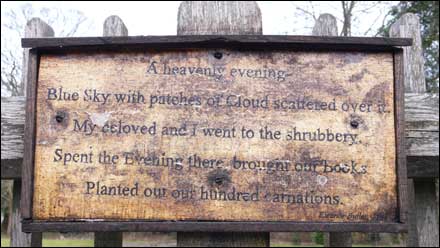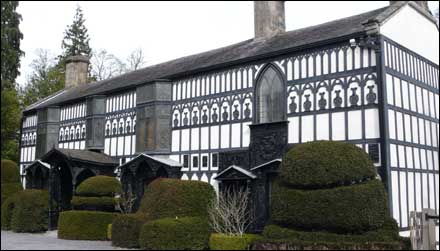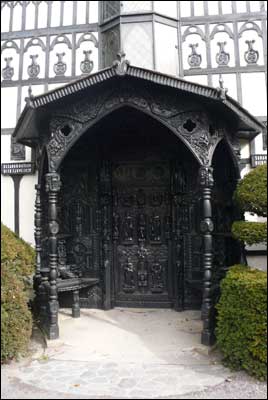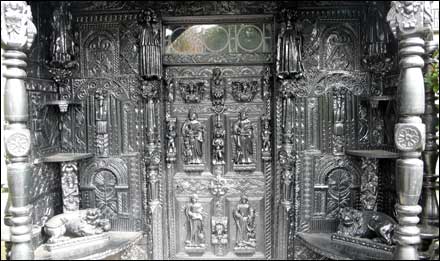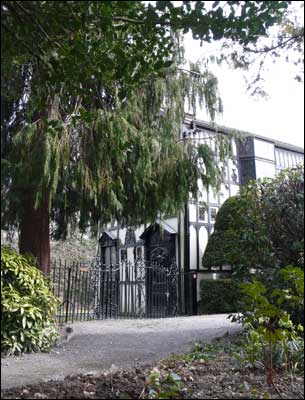Over the years, I've been told that one of my strengths as a writer is my use of dialogue. I hope people are right about that because I write light-hearted stories, and it seems to me that most of what we find humorous in fiction comes from what the characters say to each other. There are other important uses for dialogue. It's easy to read, which makes it pleasurable for the reader, giving her a rest from introspection and description. It creates the sense that something interesting is happening. Furthermore, having one character tell another about what happened in the past allows the author to insert backstory without having to use flashbacks. On to the hows: Let me pass along a few tips I've learned over the years.
Obvious points
Eliminate all the extraneous fluff that we use in real life to lubricate social interaction. "Hi. How are you? Haven't seen you in a while," doesn't belong in fiction. Keep things interesting by cutting to the chase.
Use simple words, even in historical situations and with highly educated characters. I spent years surrounded by brilliant people at the University of California at Berkeley. None of them "visited to the lavatory." They went to the bathroom. Having said this, though, there is some room for flexibility. I generally decide at the beginning of writing a book which of the two main characters will use the somewhat more flowery language. That helps to give them different voices.
Use contractions, even in historicals. I know this will rub some the wrong way, but I find it tiring to read "I cannot," "you do not," "I will," and "you are" over and over. Save the long form for when you want to make a point emphatic.
Use short sentences and sentence fragments. People don't speak in paragraphs. They often don't even speak in complete sentences. Honest.
Break large speeches into shorter ones. You can have the other character talk, too. That's why it's called dialogue. If you have a section that you can't easily break up, consider putting a speech or action tag in the middle. For example:
"Brilliant. Just brilliant," she said. "I hope your second plan for getting us off this island is better than your first."
Insert action and snippets of introspection and description where appropriate to avoid having your characters sound like "talking heads."
Somewhat less obvious points
Don't bury dialogue in the interior of paragraphs. It gets lost in there. Put it at the beginning or the end or in a paragraph of its own.
In general (this is not a hard and fast rule), don't have your characters answer direct questions. This sounds odd on the surface, but you can create a wonderful battle of wills if one person requests information and the other person refuses to surrender it. Even "who wants to know?" can be more interesting than a direct answer.
Figure out how your characters swear, even if it's only "horse feathers!" Your characters are going to be in conflict and in frustrating and/or dangerous situations. They're going to do quite a bit of swearing, in external dialogue and in introspection.
Far less obvious points
Send in some dialogue from "out in left-field." Left-fieldedness implies something unexpected or odd -- on the surface wrong but containing some element of rightness or fit. Over the years, left field has come to be thought of as a home for oddball notions and people. As Yogi Berra, the great catcher and left-fielder for the New York Yankees once said of left field, "It gets late early out there."
I can't define left-fieldednss, but I can recognize it when I see it. Other Yogi-isms include, "The future ain't what it used to be," and "No one goes there any more. It's too crowded." They're nonsensical, but they make sense, nevertheless. I hope you'll find a few lobs from left field in the excerpt below.
Create and use tension between the on-going dialogue and your POV character's thoughts. In much of romance, all exposition is internal monologue, anyway. Even objective states of the world are interpreted through the character's perceptions and thoughts. By having one dialogue going on with another character and a contrasting internal monologue going on in the POV character's head, you create tension that's pleasurable to the reader.
In the following scene, my hero (who by the way is the Orchid Thief) has to find some explanation for why he and the heroine have been out all night -- something that most assuredly wasn't done in polite society in Victorian England. Because he hasn't had a chance to prepare a story, he finds himself having to make one up on the spot.
“Where have you been, Philip? I’ve been sick with worry.”
"You needn't have been," he replied.
“How can you say that? That murderous Orchid Thief was right under our noses.”
“I don’t think he’s murdered anyone, Mother.”
“Right under our noses,” she continued. “They almost caught him, you know.”
He knew that far better than he cared to. “Did they really?”
“Chumley had him trapped in one of the bedrooms, but he escaped. Impossible, if you ask me, how a thief can slip into and out of bedrooms without being seen. It isn’t natural.”
“Now, Mother, it’s done every day, and not for thievery. At least, not in the strictest sense of the word.”
“I wouldn’t know about that,” she said. “And I wish you didn’t, either.”
“Sorry.”
“People know entirely too much these days, and just look at the state of the world as a result. Your father didn’t know anything when I married him, and almost forty years later, he still doesn’t.”
“I’m sure you’re right about that,” Philip said, although he couldn’t quite picture his father never having found his way into a bedroom where he didn’t belong.
“Marriage does that for a man,” she said. “But I wasn’t talking about that. What was I talking about?”
“The Orchid Thief,” he supplied.
Her eyes narrowed. “No, I wasn’t. I was talking about where you were last night. Or, where you weren’t. You weren’t here—I know that much.”
“I was out.”
“Obviously.” She crossed her arms over her chest. “Where?”
“Here and there.” He had to do better than that, but he hadn’t had any time to prepare for this inquisition.
“And did you take the princess here and there with you?”
“As a matter of fact, I did.”
“Oh, dear heaven.” She pulled a handkerchief from her bosom and dabbed at her eyes with it.
“I could hardly leave the princess behind, not with the Orchid Thief on the loose.”
“It’s all my fault,” his mother wailed. “I’ve been too indulgent with you.”
He stood and stared at the woman he’d called Mother for his entire thirty-five years on earth. What she said didn’t normally make complete sense, but it normally made some sense. How in hell could any of this be her fault? Still, if she wanted to accept blame for the fact that he’d disappeared with a princess during a jewel burglary and hadn’t returned until the next morning, who was he to object?
“I let you run wild all these years, and now my chickens have come home to roost.”
“Chickens?” he repeated.
“Isn’t that the expression?”
“Yes, absolutely. Chickens.”
“Don’t be ridiculous,” she said. “This has nothing to do with barnyard animals. I want to know where you and the princess were all last night.”
He cleared his throat, attempting to buy a bit more time. His mother wasn’t having any of it, though, as she made clear by tapping her foot against the carpet.
“Ah, well,” he said finally. “That’s confidential.”
“Nonsense. I’m your mother.”
“How right you are,” he said. “But, you see, it’s the princess’s secret.”
“How could she have any secrets? She just arrived in
London.”
“She’s an incredibly quick study, our princess.”
His mother’s foot-tapping grew more vigorous, until the hem of her dress shook with it. “Go on.”
“Well, you see, she’d grown very upset at being so nearly accosted by the Orchid Thief that she begged my assistance in seeking the only solace that helps when her nerves are shattered.”
“And that is…”
“Yes, well.” He cleared his throat again and searched his brain for someplace—anyplace—that might be acceptable for a young woman to be in the middle of the night in London. “A church,” he blurted finally.
His mother’s foot stilled. “A church?”
“Yes, a church.” Thank heaven he’d thought of that. “A Greek Orthodox church.”
“Greek Orthodox,” she repeated, her eyes growing wide. “The princess is Greek Orthodox?”
“Well, no, she isn’t, exactly.”
“Not that your father or I would care that she’s something like Greek Orthodox, mind you. But not everyone is so open-minded.”
He didn’t doubt that for a moment. In fact, if his mother’s mind got any more open, she wouldn’t be able to hold anything inside it at all.
“I believe the princess is Church of England,” he said. Although asserting that royalty from Valdastok was Church of England would be a dicey proposition, indeed. “Or at least, I think that’s what she told me. But, you see, one of her ancestors was Greek Orthodox. Someone very famous. Charlemagne, I think.”
His mother tipped her head and looked at him as if he’d gone quite mad. “Charlemagne was Greek Orthodox?”
“Perhaps it wasn’t Charlemagne,” he said, tossing his hand into the air as though he might grasp something there that would get him out of this hideous mess. “Perhaps it was Alexander the Great.”
“Alexander the Great?” she repeated. He’d done such a splendid job of confusing her, she’d started to sound like an echo.
“Alexander conquered that entire part of the world, didn’t he?” Of course, he’d done it centuries before the Greek Orthodox Church ever existed. But why quibble at this point?
“Yes,” she said softly. “I suppose you’re right.”
“The crux of this whole tale is that the princess had a very powerful ancestor who was Greek Orthodox, and now any time she feels distressed, she seeks out this ancestor’s wisdom in the bowels of a Greek Orthodox church. As you can imagine, she was most distraught at her near encounter with the Orchid Thief.”
“Of course. We all were.”
“She prevailed upon me to find her a Greek Orthodox church,” he added. “There aren’t many of them in London, so it took some time. And then, we had to wake the priest to let us in.” “The priest let two strangers into his church in the middle of the night?” she asked.
“I bribed him.”
“And so, all this time, you and the princess have been in a Greek Orthodox church.”
“Exactly.” He walked to her and put his hands on her shoulders. “I’m so glad you understand.”
She looked up at him with the delightfully distracted air he knew so well. All his life she’d nearly caught him at something naughty. But she’d never quite succeeded. It gave him inordinate pleasure to realize that he could still befuddle her into agreeing with him. Andrew had never quite managed the trick, poor soul.
“You and the princess were in a Greek Orthodox church all night?” she echoed.
“It was quite late by the time we discovered the church and got inside. Then, the princess set to praying her little heart out—in Greek, of course.”
“She speaks Greek?” his mother asked in a pitch near what only dogs could hear.
Perhaps he’d overdone that last bit. “A few prayers only.”
“Greek,” she repeated.
“Terrible, droning things, those prayers. On and on she went. Before I knew it, I’d fallen asleep in one of the pews. When I awoke, she’d also fallen asleep.”
“You slept together?” she demanded.
“She was in a different pew. Several pews over, in fact. Nowhere near me at all. Fully dressed.”
“And you stayed that way all night.”
“We awoke some time after dawn, found the first cab we could and came directly home.”
“Well.” She stepped away from him and paced for a few feet toward the window and back. “This just isn’t done. It isn’t accepted. It isn’t…”
Heaven help him, if she said “orthodox,” there’d be no hope for him. He’d burst out laughing at the ridiculousness of his own story.
“…decent,” she concluded.
“But a church, Mother,” he said. “We were in a church. What could go wrong in a church?”
“A Greek Orthodox church,” she said. “How would I know what could go wrong in a Greek Orthodox church? I’ve never been in one.”
“Mother, please don’t exercise yourself over this. We’re both fine, and no one need know about this incident unless you tell them.” Unless the servants spoke to someone else’s servants, which was probably how most of London gossip got spread from house to house. He’d deal with that eventuality when it arose. “All right, Philip,” she said. “I’ll trust you this time.”
“You’re a dear.”
“But don’t let anything like this happen again. We can’t go on overlooking this sort of behavior, your father and I.”
“I understand.” Although, if she told this story to his father, she’d no doubt jumble it up so badly he wouldn’t understand a word. “You have my promise.”
“We not only have your interests to consider but the princess’s as well. We might be forced to make you do the right thing by her, and I don’t think the right thing is anything like something you’d think of as right.” She stopped at the end of that, clearly having confused herself. “To do. Whatever that might be.”
“I understand.”
She straightened. “Good then. Now, go and dress yourself properly.”
“I will.” He turned and headed toward the door.
“And Philip,” she called. He stopped and turned back. She raised her hand and pointed a finger at him.
“No more churches!”









